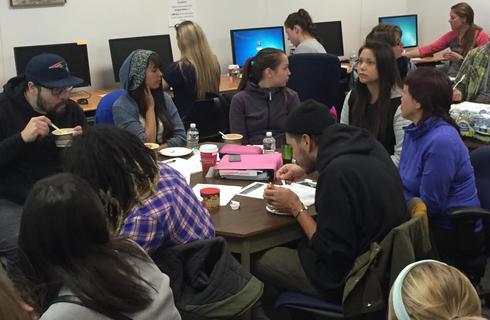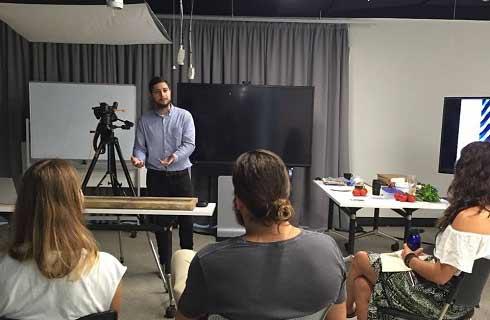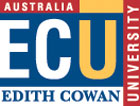青年工作学士
Bachelor of Youth Work

学历文凭
Bachelor Degree

专业院系
School of Arts and Humanities

开学时间

课程时长

课程学费

国际学生入学条件
IDP—雅思考试联合主办方

雅思考试总分
- 雅思总分:
- 托福网考总分:
- 托福笔试总分:
- 其他语言考试:
CRICOS代码: 079117A
申请截止日期: 请与IDP联系 以获取详细信息。
课程简介
Provides a comprehensive program of study in the essentials of youth work as an embedded practice within community work The course includes specialist units in youth work plus complementary studies in community workStudents can choose complementary areas of study such as Aboriginal and Intercultural Studies Addiction Studies Family and Child Support Community Work Criminology Psychology Counselling Visual Arts Media and Communication Events Management and Outdoor AdventureCourse learning outcomesApply broad theoretical and technical knowledge of youth work theory methods principles and values to a range of situations relevant to Youth Work including its contribution to society communities and young peopleThink critically to analyse and make decisions about complex ideas encountered in Youth Work that take into account environmental social cultural and economic implicationsUse digital technologies to access evaluate and synthesise relevant information from multiple sources that are appropriate to Youth WorkCommunicate knowledge of sociological perspectives on youth and independently express ideas clearly coherently and appropriately to diverse audiences including young people families colleagues and the publicDemonstrate how global context shapes similarities and differences in work with young people and develop a crosscultural responsiveness including Indigenous cultural competenceWork collaboratively to develop programs projects and services that exhibit social sustainable and ethical values relevant young peopleDemonstrate autonomy accountability and judgement for own learning in professional practice in work with young people
相关申请
 预科
预科 奖学金
奖学金 实习机会
实习机会 在校学习
在校学习 跨境学习
跨境学习 校园授课-线上开始
校园授课-线上开始 在线/远程学习
在线/远程学习
开学时间&学费
学费信息仅供参考,请与IDP联系以获取详细信息
| 开学时间 | 时长 | 学费 | 地点 |
|---|
学校排名

世界排名501
数据源:
泰晤士高等教育世界大学排名
关于伊迪斯科文大学

埃迪斯科文大学(ECU)创建于1991年,是澳大利亚一所现代化的院校,因开设具有超前思维的先进课程而闻名,致力于帮助其学生为满足未来社会的需求做好充分准备。在''2024年优秀大学指南''(Good Universities Guide)中,该校的教学质量被评为五星级。该校已连续17年获得此成绩。埃迪斯科文大学位于西澳大利亚州首府珀斯,因规模庞大的古岩层景观、世界一流的酒庄和数千英里有着温暖清澈海水的沙滩而闻名。这是一座充满活力的城市,经济发展迅速,有大量旅游胜地和活动供学生去探索。埃迪斯科文大学开设有250多门课程。该校与专业合作伙伴共同开发了这些课程,确保课程内容始终与行业需求相关。许多课程包含职业模块、实习和小组项目,培养学生优秀的批判思考能力,使该校毕业生受到未来雇主的青睐。埃迪斯科文大学还因提供必要的支持服务而闻名,旨在确保其3.1万名学生的学术能力和个人能力得到全面发展。该校提供奖学金和助学金,还有一个积极活跃的学生会。学生会经常举办社交活动,并成立了很多俱乐部和社团,学生可以自由选择参加。该校营造了一个热情的学生社区,拥有由来自100多个国家的约6000名国际学生组成的充满活力的多样化学生群体,国际学生满意度指标得分很高。
本校相关课程

理学学士(物理学)荣誉
学历文凭
Bachelor Degree with Honours
开学日期
课程费用总额


文学士(艺术管理)
学历文凭
Bachelor Degree
开学日期
课程费用总额


教育领导力研究生证书
学历文凭
Graduate Certificate
开学日期
课程费用总额


公共卫生研究生文凭
学历文凭
Graduate Diploma
开学日期
课程费用总额


工程科学学士
学历文凭
Bachelor Degree
开学日期
课程费用总额


语言病理学学士
学历文凭
Bachelor Degree
开学日期
课程费用总额

其他相关课程

社会工作硕士
 塔斯马尼亚大学
塔斯马尼亚大学学历文凭
Masters Degree (Coursework)
开学日期
课程费用总额


教育学士学位(R-7年级)和特殊教育学士学位
 弗林德斯大学
弗林德斯大学泰晤士高等教育世界大学排名:307
学历文凭
Dual Degree
开学日期
课程费用总额


社会工作硕士
 乐卓博大学
乐卓博大学泰晤士高等教育世界大学排名:267
学历文凭
Masters Degree (Coursework)
开学日期
课程费用总额


咨询硕士
 莫道克大学
莫道克大学泰晤士高等教育世界大学排名:438
学历文凭
Masters Degree (Coursework)
开学日期
课程费用总额


社会工作硕士(专业资格)
 詹姆斯·库克大学
詹姆斯·库克大学泰晤士高等教育世界大学排名:361
学历文凭
Masters Degree (Coursework)
开学日期
课程费用总额


社会工作学士,文学学士(国际关系)-社会工作学士
 南澳大学
南澳大学学历文凭
Dual Degree
开学日期
课程费用总额










